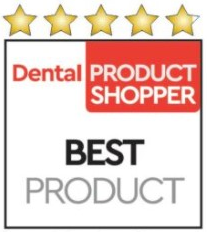 Universal Bond is a true universal that produces strong bonds without the need to agitate or light cure
Universal Bond is a true universal that produces strong bonds without the need to agitate or light cure
If you’re like most dentists, you probably take claims such as “universal” and “time saving” with a grain a salt. That healthy bit of skepticism makes you a smart consumer. It also provides you with the opportunity to sometimes be pleasantly surprised.
Tokuyama’s Universal Bond produces high bond strengths to virtually all dental substrates, and it does so without the need to agitate, add activators or primers, light cure, or wait between placement and air-dry polymerization, according to Tokuyama. We asked our evaluators to be the judge for this Tokuyama Universal Bond review. “[Universal Bond] saved time by not having to light cure the bond or agitate it into place for 20 seconds,” said Irene Renieris, DDS, one member of that team of evaluators. “Overall, it shaved time off of my composite restorations,” she added. “I didn’t think that was still possible in 2018.”
Ease of Use: Time Savings
 According to Tokuyama, Universal Bond shortens chair time for both staff and patients. Simply mix one drop of Bond A and Bond B, which triggers the Active-Chemistry self-cure and provides worryfree polymerization where curing lights cannot reach. “I like the ease of application and that the product is a self cure,” noted Dr. Jodi Lampert, and Dr. Julio Maya appreciated that it was “easy to use and takes less time.” For Dr. Felipe Falcao, the biggest change was that no light curing was needed, which he said was “definitely a plus.” Dr. Joel Gentry also liked that no etching or light curing is needed before application of the resin, and Dr. Bethaney Brenner agreed and called it very easy to use. “It streamlined workflow on direct composite restorations, particularly when multiple teeth were involved,” concluded Joseph Ritz, DMD.
According to Tokuyama, Universal Bond shortens chair time for both staff and patients. Simply mix one drop of Bond A and Bond B, which triggers the Active-Chemistry self-cure and provides worryfree polymerization where curing lights cannot reach. “I like the ease of application and that the product is a self cure,” noted Dr. Jodi Lampert, and Dr. Julio Maya appreciated that it was “easy to use and takes less time.” For Dr. Felipe Falcao, the biggest change was that no light curing was needed, which he said was “definitely a plus.” Dr. Joel Gentry also liked that no etching or light curing is needed before application of the resin, and Dr. Bethaney Brenner agreed and called it very easy to use. “It streamlined workflow on direct composite restorations, particularly when multiple teeth were involved,” concluded Joseph Ritz, DMD.
A quicker procedure time is especially beneficial when working with pediatric patients, noted Dr. Laura Lam, who said, “Removing the need to light cure was very helpful with regard to treatment of patients who have limited ability to tolerate chairside treatment, especially pedo patients.” While working on a pediatric patient in a hurry to keep them from losing patience, Dr. Renieris said she “etched, rinsed, applied the bond and the filling right over, and didn’t have to waste time curing the bond.” Prosthodontist Michelle Na said the material proved critical for pediatric patients or patients with TMD, reducing time in all steps, speeding up the restoring process and making patients comfortable. She added, “A different color in bottle A and B assures the mixing is done when it turns blue.” When asked for suggested improvements, Dr. Lampert said she sometimes had difficulty knowing when the product was dry enough, and a few other evaluators suggested single-bottle delivery.
Versatility
Because of its high adhesive performance to different types of substrates—such as enamel, dentin, metals, composite resins, zirconia, ceramics, alumina—Tokuyama says it’s the only real universal bonding agent for all materials. Dr. Maya called it a “true universal” and Dr. Ritz said its universal application is very valuable. “The ability to use one bonding system for all restorative procedures makes this bonding agent the go-to every time, decreasing inventory and saving money,” noted Dr. Falcao, whose favorite feature was the product’s versatility. Dr. Renieris reported that she got many uses from the provided bottles. After using Universal Bond under all restorations to seal tubules and decrease sensitivity, Dr. Gentry concluded, “It bonds to everything! Especially to glass dappen dish and plastic reservoirs.”
Reduced Sensitivity
Noting there was absolutely no sensitivity for her patients after treatment with Universal Bond, Dr. Brenner shared, “I loved this product. It’s very easy to use, patients had no sensitivity, and the new wells to dispense in were very clever.” Dr. Manny Chopra, along with several other dentists, also reported no postop sensitivity, even when he used the material for “multiple class 5 caries sites in a patient with dental neglect.” Dr. Gentry commented on another topic related to patient satisfaction. With his previous bonding agent, numerous patients complained about the smell, but he had no complaints about the odor of Tokuyama’s material.
Overall Satisfaction
All of the evaluators said they would recommend this universal bonding system to their colleagues, including Dr. Gentry, who said he’d recommend it because of its “strong bond, quick delivery, thin layer of bond, and no sensitivity.” Dr. Falcao remarked that versatility and self-cure are great features, along with the advertised higher bond strength, and Dr. Na noted, “This bonding system surpassed in all aspects of bonding procedures.”







